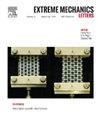表征软质材料力学性能的圆柱腔膨胀
IF 4.5
3区 工程技术
Q2 MATERIALS SCIENCE, MULTIDISCIPLINARY
引用次数: 0
摘要
软质材料的低弹性模量,结合几何非线性和速率依赖性,对其力学响应的表征提出了重大挑战。介绍了一种利用圆柱空腔膨胀法测量软质材料大变形力学性能的新方法。在这种方法中,在材料中制造一个圆柱形腔,并通过体积控制注入不可压缩流体来膨胀,同时测量腔壁处的施加压力。然后利用施加压力与腔壁变形之间的关系来表征非线性力学性能。该方法通过精确控制初始缺陷或空腔的几何形状和尺寸,改进了传统的体积控制空腔扩展测试和其他针激空腔扩展方法,显著提高了实验结果的准确性和可重复性。我们通过测量合成聚二甲基硅氧烷(PDMS)的力学性能并与文献报道的值进行比较,证明了所提出方法的可行性。结果表明,柱腔扩展法能有效地捕捉PDMS在大刚度范围内(剪切模量从5 kPa到300 kPa)的响应,且具有较高的重复性。该方法克服了使用传统测试方法表征超软材料的局限性,例如单轴拉伸测试中的制造和夹紧挑战以及压缩和压痕测试中的摩擦和粘附效应,从而实现了准确和精确的表征。本文章由计算机程序翻译,如有差异,请以英文原文为准。
Cylindrical cavity expansion for characterizing mechanical properties of soft materials
The low elastic modulus of soft materials, combined with geometric nonlinearity and rate dependence, presents significant challenges in the characterization of their mechanical response. We introduce a novel method for measuring the mechanical properties of soft materials under large deformations via cylindrical cavity expansion. In this method, a cylindrical cavity is fabricated in the material and expanded by volume-controlled injection of an incompressible fluid with simultaneous measurement of the applied pressure at the cavity wall. The relationship between applied pressure and deformation at the cavity wall is then employed to characterize the nonlinear mechanical properties. This method improves traditional volume-controlled cavity expansion testing and other needle-induced cavity expansion methods by precisely controlling the geometry and size of the initial defect or cavity, significantly enhancing both the accuracy and repeatability of the experimental results. We demonstrate the feasibility of the proposed method and validate it by measuring the mechanical properties of synthetic polydimethylsiloxane (PDMS) and comparing with reported values in the literature. Results indicate that the cylindrical cavity expansion method effectively captures the response of PDMS over a wide range of stiffness (shear modulus ranging from 5 kPa to 300 kPa) and exhibit high repeatability. The proposed method overcomes limitations in characterization of ultra-soft materials using traditional testing methods, such as challenges with fabrication and clamping in uniaxial tension testing and friction and adhesion effects in compression and indentation testing, thus enabling accurate and precise characterization.
求助全文
通过发布文献求助,成功后即可免费获取论文全文。
去求助
来源期刊

Extreme Mechanics Letters
Engineering-Mechanics of Materials
CiteScore
9.20
自引率
4.30%
发文量
179
审稿时长
45 days
期刊介绍:
Extreme Mechanics Letters (EML) enables rapid communication of research that highlights the role of mechanics in multi-disciplinary areas across materials science, physics, chemistry, biology, medicine and engineering. Emphasis is on the impact, depth and originality of new concepts, methods and observations at the forefront of applied sciences.
 求助内容:
求助内容: 应助结果提醒方式:
应助结果提醒方式:


